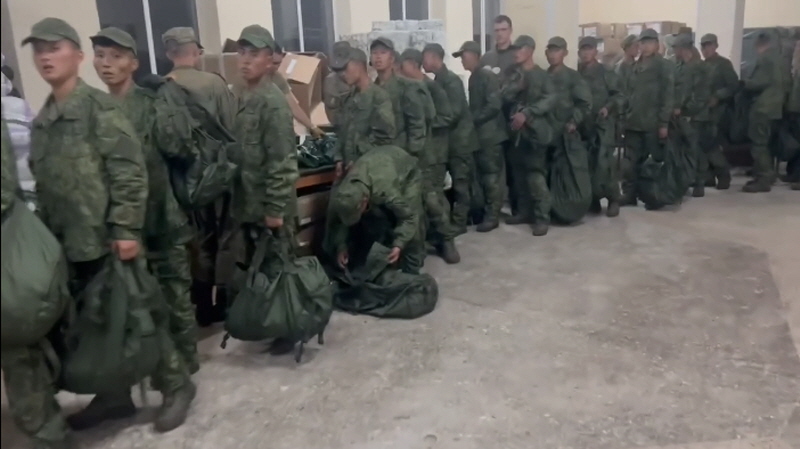Debates are intensifying over South Korea’s potential support for Ukraine with weaponry as its government weighs the diplomatic and security risks the decision could pose for the country.
President Yoon Suk Yeol suggested a possible “phased” approach, indicating that the county could “flexibly review” lethal aid “depending on North Korea’s military activities” at a news conference following a summit with Polish President Andrzej Duda in Seoul on Oct. 24.
However, concerns persist that supplying weapons could cast South Korea as a “de facto warring party.”

Following Yoon’s remarks, media outlets reported that Seoul might be considering directly supplying 155-millimeter artillery shells to Ukraine. The presidential office rebutted these claims on Wednesday, telling reporters it was not considering such direct provisions.
Seoul has been maintaining its stance against directly supplying lethal weapons to Ukraine, citing its “principle of not directly supporting lethal weapons.”
Seoul’s Defense Ministry also denied Thursday that any potential “indirect” transfer of weapons through the United States was taking place, noting that Ukraine has “never requested” such support and that “no discussions on provisions have taken place.”
Multiple foreign media outlets have reported that South Korea may have indirectly provided weaponry to Ukraine via the United States, though the South Korean government has never confirmed this.
Last year, the Washington Post reported that South Korea had sold 100,000 rounds of 155-millimeter artillery shells to its ally in 2022, referencing a Wall Street Journal report suggesting the shells were intended for Ukraine. In March of last year, South Korea reportedly “lent” around 500,000 rounds of 155-millimeter artillery shells to the United States.
The weaponry that could potentially be sent to Ukraine — 155-millimeter artillery shells, K2 tanks and K9 howitzers — is highly lethal.
“It’s unclear, under international law, whether providing weapons alone would classify South Korea as a warring party,” said Park Won-gon, a North Korean studies professor at Ewha Womans University.
“But for Russia, this could serve as justification to target South Korea as a warring party.”
Park also advised that South Korea “carefully consider where to draw the red line,” emphasizing that sending lethal weapons should remain a last resort.
A senior presidential official noted that if weapon provisions were discussed, it would be preferable to “begin by providing defensive weapons.”
Another senior official added, “Weapons themselves are neutral — they’re offensive if used for attack and defensive if used for protection.”
“Air defense measures like Terminal High Altitude Area Defense and Patriot missiles, as well as surface-to-air missiles, are not lethal even if deployed, unlike surface-to-surface missiles,” the official said.
A diplomatic source emphasized the importance of the moves South Korea might take in the process.
“Lethal weapon provision should be kept as a final option, but more critical is not the final step but the moves we make along the way,” the source noted.
Experts warn, however, that any provision should be cautiously decided, despite Ukraine’s requests.
“While providing supplies is acceptable, caution is required when considering lethal weapons like Hyunmoo missiles and K9 howitzers, even if Ukraine makes repeated requests,” said Hong Suk-hoon, an international relations professor at Changwon National University.
“A conservative approach is crucial, as it could inadvertently give North Korea an excuse for provocations against the South or turn the Ukraine war into a proxy conflict involving the two Koreas.”
Some experts also advise against reactive measures, stressing the need to understand the fundamental nature of North Korea’s military support for Russia.
“The North Korea-Russia alliance differs in nature from the South Korea-U. S. alliance; it’s more of a ‘reckless stunt’ spurred by temporary needs,” said Park Ihn-hwi, a professor of international studies at Ewha Womans University.
“We should be cautious not to mirror their disruptive actions, thereby avoiding unnecessary entanglement.”
Others suggest looking beyond the immediate situation to the U.S. presidential election, now just five days away.
With the race remaining deadlocked, Republican candidate and former President Donald Trump has repeatedly said that, if elected, he would “end the Ukraine war” before taking office next January.
Should Trump’s re-election lead to cease-fire negotiations and reduce the need for Pyongyang troops, there may be little incentive or justification for Seoul to supply lethal weapons.
“We need to ask if now is the right time to consider lethal weapon support, which is ultimately a last resort,” said Eom Gu-ho, a Russian studies professor at Hanyang University’s Graduate School of International Studies.
“It is essential to carefully assess the mutual benefits Russia provides North Korea, as well as the global situation after the U.S. election, before making a decision.”
BY PARK HYUN-JU, CHO JUNG-WOO [cho.jungwoo1@joongang.co.kr]




